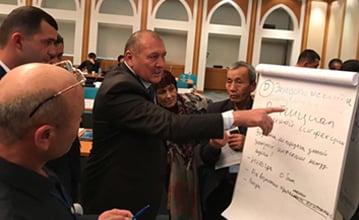At a glance
CDC, the Defense Threat Reduction Agency (DTRA), and the Food and Agriculture Organization of the United Nations (FAO), have worked closely with Uzbekistan’s government on ways to prevent zoonotic diseases through new approaches in tracking diseases, improved medical tests, and the standardization of clinical guidelines.

Background
Uzbekistan, a country in Central Asia and part of the former Soviet Union, faces challenges in controlling and preventing zoonotic diseases, which can spread between people and animals. Health risks like brucellosis, which occurs in high numbers in both people and livestock in the region, exist due to inadequate health and veterinary systems, and limited laboratory and surveillance system capacities in the country. The government of Uzbekistan recognizes the threat posed by zoonotic diseases (as the country sees major economic growth in livestock production) and is working to improve the country's capacity to prevent, control, detect, and treat them.
One Health Collaboration
For the past three years, CDC, the Defense Threat Reduction Agency (DTRA), and the Food and Agriculture Organization of the United Nations (FAO), have worked closely with Uzbekistan's government on ways to prevent zoonotic diseases through new approaches in tracking diseases, improved medical tests, and the standardization of clinical guidelines. These approaches work best through multisectoral, One Health collaboration that establishes connections between a country's human health, animal health, and environmental sectors.
Beginning in November 2017, representatives from Uzbekistan's human and animal health sectors and CDC, in collaboration with FAO, and U.S. Department of Agriculture (USDA), launched the first in a series of four roundtable discussions on One Health. The purpose of these discussions included the development of a 5-year strategic plan for implementing One Health approaches and determining a One Health organizational framework, guided by components of the CDC One Health Strategy Toolkit, which is currently under development. With support and coordination provided by DTRA and the CDC-Uzbekistan office, these events brought together experts in human, animal, and environmental health to coordinate limited resources to prevent, detect, and respond to disease threats employing a multisectoral, One Health approach.
In coordination with roundtable discussions, a team of CDC staff and representatives from Uzbekistan's Ministry of Health, State Veterinary Committee, Ministry of Emergency Situations, and State Committee for Ecology and Nature Protection facilitated a One Health Zoonotic Disease Prioritization (OHZDP) Workshop in November 2018 to work together to identify Uzbekistan's zoonotic diseases of greatest concern. CDC staff trained representatives from the participating ministries to serve as OHZDP Workshop facilitators, enabling Uzbekistan to lead its own workshops at the national and subnational level.
Prioritizing Uzbekistan’s Zoonotic Diseases of Greatest National Concern
The OHZDP tool is a country-owned process that allows participants from multiple sectors to select and rank criteria to define the national importance of zoonotic diseases, generating a final list of the top priority zoonotic diseases for multisectoral, One Health collaboration. Using the OHZDP tool guides discussions on how to enhance public health capacity building efforts, best use resources, and further collaborate on prevention and control efforts for the prioritized zoonotic diseases, all while incorporating equal input from all sectors involved in zoonotic disease prevention and control.
“Our representatives were introduced to many other points of contact so that we can continue to collaborate and work together,” said Dilmurod Ruziboev, a representative from the State Committee for Ecology and Nature Protection.

“The major impact of this workshop is that we are using, for the very first time, an instrument that allows us to incorporate objective measures and statistical methods into a prioritization process,” says Mukhiddin Ruzimurodov, Head of Laboratory of Research Institute of Veterinary Science. As a trained facilitator and workshop participant representing the State Veterinary Committee, he stated, “we can use this tool to prioritize zoonoses within each particular region in Uzbekistan.”
Another trained facilitator, Gulnara Khudaykulova, Associate Professor of the Department of Infectious and Pediatric Infectious Diseases at Tashkent Medical Academy, believes the OHZDP tool could be applied for various public health issues, not just for zoonotic disease prioritization. “Through the introduction and use of the tool, we have learned to identify hidden problems in the public health system,” said Khudaykulova.
At the end of the workshop, the group identified eight priority zoonotic diseases of greatest national concern that will be addressed using a One Health approach involving human, animal, and environmental health sectors in Uzbekistan. Workshop participants identified next steps for combatting the newly prioritized zoonotic diseases.
Results

Action steps determined and multisectoral links developed during the OHZDP Workshop helped fuel the discussions at the following two One Health roundtables for strategic planning. The CDC and USDA facilitation team used CDC's One Health Strategy Toolkit to further develop the remaining sections of Uzbekistan's One Health strategic plan through multisectoral information sharing and decision-making.
The final roundtable held in April 2019 resulted in a completed One Health strategic plan, consisting of goals, objectives, action plans, roles and responsibilities, and indicators for monitoring progress. The three goals outlined in the strategic plan cover zoonotic disease surveillance and laboratory systems coordination and capacity building, a multisectoral, One Health coordination mechanism in the form of a Sub-Commission for One Health, and a One Health training program. The One Health organizational framework visualized essential networks needed to have a functioning One Health coordination unit. Representatives of the participating ministries were tasked with determining the steps needed to obtain appropriate legal authority for operations.
Roundtable participants agreed on having a ratified strategic plan and operational documents for the organizational framework in the months following the April 2019 discussion. A report of the methodology and results from the OHZDP Workshop in Uzbekistan will soon be available in both Russian and English (OHZDP Reports). The outcomes of events led collaboratively between CDC, national ministries, and other relevant stakeholders ultimately strengthen the health security of Uzbekistan, helping to better prepare the country for constantly evolving zoonotic disease threats.

Uzbekistan’s Prioritized Zoonotic Diseases
- Crimean-Congo hemorrhagic fever
- Anthrax
- Rabies
- Brucellosis
- Zoonotic tuberculosis
- Plague
- Zoonotic influenza (avian and swine)
- Echinococcosis
